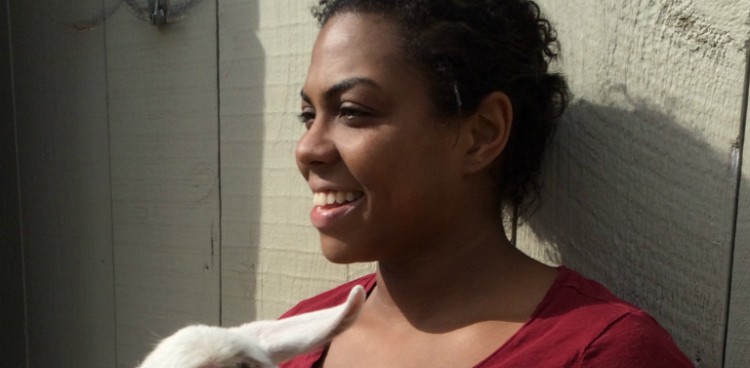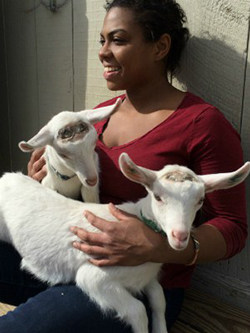
When you pick up a wedge of cheese at your grocery store, the milk-type or age might catch your attention, but what about the people behind the cheese? Cheesy Personalities is a series of Q&As with some of the dairy industry’s finest that sheds light on the hardworking folks that dedicate their lives to producing the highest-quality products, from farm to fridge.
Missed last week’s feature? Check out our interview with Jasper Hill’s Nat Bacon here.
UPDATE, MARCH 3, 2021: Kyra James is now Professor of Curriculum Development at The Cheese Culture Coalition.
When Kyra James enrolled at Syracuse University to study marketing and entrepreneurship, she never thought she’d wind up working in a specialty cheese shop. She moved from Connecticut to upstate New York with a love for sports and the intention of going into sports marketing upon graduation. When she completed her undergraduate degree, she moved to New York City to take a job at an online marketing firm, where she worked from a desk in a cubicle for four years.
But when Kyra unexpectedly developed severe allergies as an adult, her diet became the forefront of her focus and her love for food came to fruition. She quit her boring cubicle job, moved to Boston, and spent her savings on a graduate degree in gastronomy at Boston University. While in school Kyra landed a part-time gig at Formaggio Kitchen—a gourmet food shop with locations in New York, Boston, and Camrbidge, Mass.—working seven days a week between the shop and a second job at a local bakery. She quickly realized she had a passion for artisan cheese and took a full-time job at Formaggio when the opportunity arose.
Kyra now leads the South End location as a full-time manager, cheesemonger, and overall jill-of-all-trades. From event planning and teaching classes to cheese buying and retail, Kyra’s passion for food and culture is an essential part of all the work she does.
What does your job at Formaggio Kitchen entail?
Most of it is just serving customers. We have a full deli, cheeses, and charcuterie that we hand-cut to order. Everything is requested by the customer, so most of our job is to sell, like any type of retail shop. Aside from that, I have buying responsibilities, so inventory on a daily basis. It’s a really small shop, so it’s important to know what you have on the shelves and order accordingly. Since we work with local, small producers, it takes a week to two weeks to get a product in. So that’s a part of it, too. And then there’s managing, [and] delegating, but I’m also in charge of stocking cheese when I’m there. Most of it is to just sell delicious foods to people who come in and ask for it.
How do your day-to-day responsibilities vary?
You never know who’s going to walk through the door. You could think it’s going to be a really slow evening, then somebody will walk in and say, “I’m having an event for Bastille Day.” This happened to me two weeks ago. They’ll say, “I need for 100 people, eight quarter-pound pieces of each of these cheeses.” So I did that for 45 minutes without having any idea that would happen. You have to be prepared for anything, but at the end of the day, you’re going to be telling a story about cheese, tasting cheeses—a lot of it is centered around showcasing the cheeses in the best light that you can. It’s a lot of talking.
What sparked your initial interest in cheese?
I’m one of half of the employees at Formaggio Kitchen who have transitioned from a different career. I was in marketing, and I moved to Boston to go to the Gastronomy [the study of the relationship between food and culture] program at Boston University, so my path to cheese was more from my love of food that’s good, high quality, and produced by hand. That was my draw to Formaggio Kitchen, and then the cheese just sort of happened. I never thought I’d know as much as I know about cheese. It wasn’t a dream of mine to be involved in cheese, but I definitely think it’s the direction I should be going. I think cheese, especially artisanal cheese, is a really good avenue to understand a lot of aspects of the food industry. I think that’s where my love is right now, just the bigger picture of cheese and what it provides and adds to the food industry as a whole.

How did you make the switch from marketing to gastronomy?
Right after ending college, I developed adult food allergies that were very broad and unknown. My skin has a very sensitive reaction to certain foods, like chocolate, beer, coffee, tea, and nuts. So that made me change my diet, made me look at recipes more, made me think about ingredients a lot more, turned me on to Food Network like so many people that are in food. I never really thought about it as a career until I moved here, until I made the choice to just quit without any sort of reasoning besides needing something different. I feel like it’s where I’m supposed to be, but I thought I was going to do sports marketing. Food wasn’t really something I was into until I had to be.
What kinds of friendships or relationships have you formed as a result of working in the cheese industry?
One of the reasons I’ve stayed at Formaggio for so long is because of the relationships I’ve built and the people that I work with. We’re all from such different walks of life, but there’s something about artisanal food that brings a very specific type of person. I spend a lot of time with Grant, and Amy, and Molly [Ed. members of the culture staff, with whom Kyra works on Counter Culture educational events], and we’re all very different, but we all have a very similar passion for what we do. So I think that can be applied to my coworkers at Formaggio, or the people I meet networking at cheese events. I think it brings people who really care about food, the people who make it, the animals that produce the milk… It’s a very emotionally motivated industry, and most are really good people who want the best for everyone and everything, and that’s what helps you make friends and keep them.
What are your relationships with your customers like?
I pride myself in my relationship building and knowing people. Whether or not I know a customer’s name, it’s really important to me to know their likes, their allergies, their dislikes, so I feel like people appreciate me because I’ll remember their last visit. I’ll remember how they liked their prosciutto laid out, I remember what thickness they like it cut. So those kinds of acknowledgments by the customer that I care about them specifically, that’s really rewarding for me. What I remember is when people come back after and they say, “You helped me with this event last week and everybody loved it, you did a great job, thank you so much,” smiling ear to ear. That kind of thing is what keeps me going, when people appreciate. What I’m doing is not just selling cheese, I’m making a difference in a really weird and corny way.
What’s the most rewarding part of your job?
I like teaching on the class side of things. I do educational trainings with culture, but I also teach classes with Formaggio, so a lot of the reward for me is after a class or during a class. As someone who switched careers and took more than a 50% pay cut when they did so, and with parents hesitant to support the decision to do that, I think it’s really helpful that they came to a class and could see what I’m doing through my education. When people come up to me after a class and thank me for all they learned, it makes me feel like what I learned is not in vain, or stupid, or meaningless. I feel like teaching is probably the most rewarding part for me. And teaching can be day-to-day, too. If a customer comes in and has never been to an artisanal cheese shop, 15 minutes later, what they thought about cheese is turned upside down because they’ve never really talked to anyone about cheese.
What pairings are you into right now?
I think lighter, more lemony and cooler cheeses are really good when it’s hot out in the summertime. It also has to do with what you’re drinking or pairing with it. Right now, I’d say really fresh goat cheese are probably the things I recommend the most right now. It’s rosé season, so they go really well together—and honey. Just keep it really light.
Formaggio Kitchen South End
268 Shawmut Ave
Boston, MA 02118
Monday–Friday: 9:00 a.m.–8:00 p.m.
Saturday: 9:00 a.m.–7:00 p.m.
Sunday: 11:00 a.m.–5:00 p.m.



